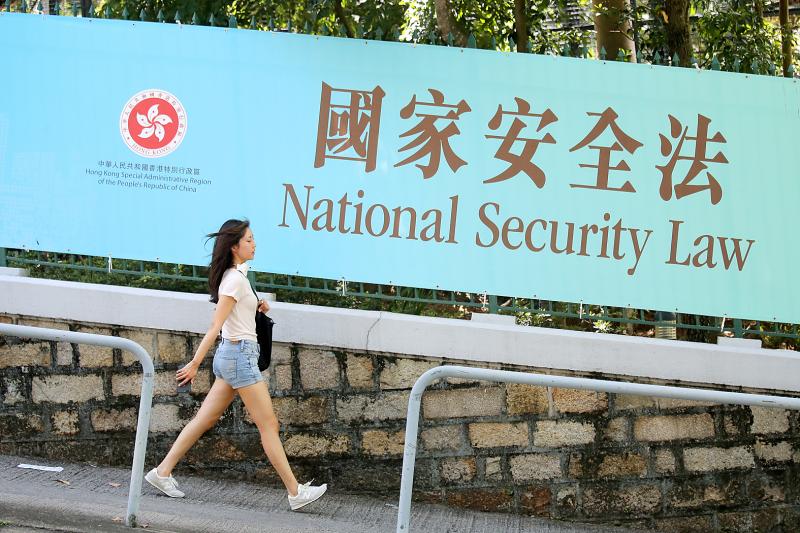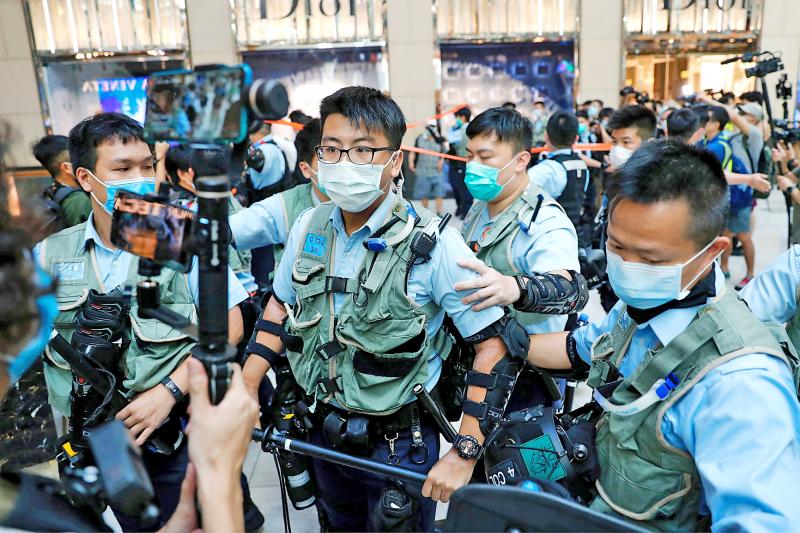China yesterday imposed a sweeping national security law on Hong Kong, a historic move that critics and many Western governments fear will smother the territory’s freedoms and hollow out its autonomy.
As the law was signed by Chinese President Xi Jinping (習近平) little more than six weeks after it was first unveiled, Beijing described it as a “sword” hanging over the heads of those who endanger national security.
The contents of the law have so far been kept secret from Hong Kong’s 7.5 million inhabitants, sparking alarm, anger and fear.

Photo: AP
“It marks the end of Hong Kong that the world knew before,” prominent democracy campaigner Joshua Wong (黃之鋒) wrote on Twitter as his political party Demosisto announced that it was disbanding. “With sweeping powers and ill-defined law, the city will turn into a #secretpolicestate.”
Some Hong Kongers said that they were deleting their Twitter accounts and scrubbing other social media platforms.
In contrast, former Hong Kong chief executive Leung Chun-ying (梁振英) took to Facebook to offer bounties of up to HK$1 million (US$129,026) for anyone who could help secure the first prosecutions under the new legislation or track down people who have recently fled the territory.

Photo: Reuters
The US, Britain, the EU and Human Rights Watch have all voiced fears it could be used to stifle criticism of Beijing, which wields similar laws to crush dissent on the mainland.
The law bypassed Hong Kong’s fractious legislature and was to take effect last night, Hong Kong Chief Executive Carrie Lam (林鄭月娥) said.
“The fact that Hong Kong people will only come to know what’s really in this new law after the fact is more than preposterous,” said Claudia Mo (毛孟靜), an opposition Hong Kong lawmaker.
A summary of the legislation published by Xinhua news agency this month said that it would cover subversion, secession, terrorism and colluding with foreign forces.
China’s security agencies would also be able to set up publicly in the territory for the first time. Beijing will also have jurisdiction over some cases, toppling the legal firewall that has existed between Hong Kong and the mainland’s Chinese Communist Party-controlled courts.
On the mainland, national security laws are routinely used to jail critics, especially for the vague offense of “subversion.”
Speaking via video link to the UN Human Rights Council in Geneva, Lam attempted to defend the law.
The Beijing-appointed leader said that Hong Kong had been living with “a gaping hole in national security,” and that the law was “urgently needed.”
Lam said that the legislation would help heal a territory “traumatized by escalating violence fanned by external forces.”
She was referring to last year’s pro-democracy protests, which began in response to a now-withdrawn bill that would have allowed extraditions to the mainland.
“I urge the international community to respect our country’s right to safeguard national security, and Hong Kong people’s aspirations for stability and harmony,” she said.
Additional reporting by staff writer

The CIA has a message for Chinese government officials worried about their place in Chinese President Xi Jinping’s (習近平) government: Come work with us. The agency released two Mandarin-language videos on social media on Thursday inviting disgruntled officials to contact the CIA. The recruitment videos posted on YouTube and X racked up more than 5 million views combined in their first day. The outreach comes as CIA Director John Ratcliffe has vowed to boost the agency’s use of intelligence from human sources and its focus on China, which has recently targeted US officials with its own espionage operations. The videos are “aimed at

STEADFAST FRIEND: The bills encourage increased Taiwan-US engagement and address China’s distortion of UN Resolution 2758 to isolate Taiwan internationally The Presidential Office yesterday thanked the US House of Representatives for unanimously passing two Taiwan-related bills highlighting its solid support for Taiwan’s democracy and global participation, and for deepening bilateral relations. One of the bills, the Taiwan Assurance Implementation Act, requires the US Department of State to periodically review its guidelines for engagement with Taiwan, and report to the US Congress on the guidelines and plans to lift self-imposed limitations on US-Taiwan engagement. The other bill is the Taiwan International Solidarity Act, which clarifies that UN Resolution 2758 does not address the issue of the representation of Taiwan or its people in

US Indo-Pacific Commander Admiral Samuel Paparo on Friday expressed concern over the rate at which China is diversifying its military exercises, the Financial Times (FT) reported on Saturday. “The rates of change on the depth and breadth of their exercises is the one non-linear effect that I’ve seen in the last year that wakes me up at night or keeps me up at night,” Paparo was quoted by FT as saying while attending the annual Sedona Forum at the McCain Institute in Arizona. Paparo also expressed concern over the speed with which China was expanding its military. While the US

SHIFT: Taiwan’s better-than-expected first-quarter GDP and signs of weakness in the US have driven global capital back to emerging markets, the central bank head said The central bank yesterday blamed market speculation for the steep rise in the local currency, and urged exporters and financial institutions to stay calm and stop panic sell-offs to avoid hurting their own profitability. The nation’s top monetary policymaker said that it would step in, if necessary, to maintain order and stability in the foreign exchange market. The remarks came as the NT dollar yesterday closed up NT$0.919 to NT$30.145 against the US dollar in Taipei trading, after rising as high as NT$29.59 in intraday trading. The local currency has surged 5.85 percent against the greenback over the past two sessions, central